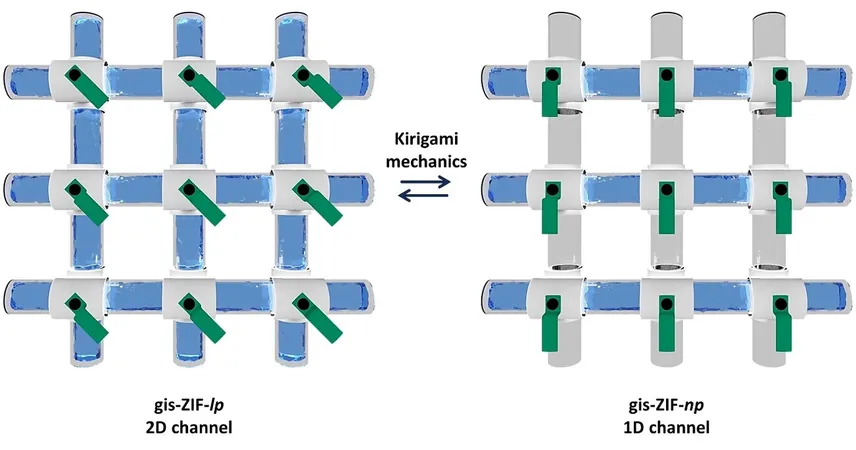
Revolutionary Foldable Molecules Could Transform Gas Management at the Nanoscale
2025-01-06
Author: Sarah
Revolutionary Foldable Molecules Could Transform Gas Management at the Nanoscale
In a groundbreaking study inspired by the age-old practice of paper folding, researchers have made a pivotal discovery at the molecular level that could revolutionize the way we manage gases and pollutants. Under the leadership of Professor Wonyoung Choe at the Ulsan National Institute of Science and Technology (UNIST) in South Korea, an innovative team has created foldable molecular paths using zeolitic imidazolate frameworks (ZIFs), a remarkable class of highly porous materials.
These advanced frameworks demonstrate an extraordinary ability to morph their size, shape, and alignment at the nanoscale, responding dynamically to changes in temperature, pressure, and gas interactions. This adaptability allows them to function much like valves in traditional pipelines, but on a molecular scale. Imagine the potential applications in environmental management: these structures could lead to the creation of smart filters that adjust in real time to capture harmful gases with unparalleled efficiency.
Published in the prestigious journal *Angewandte Chemie International Edition*, their findings underscore the practical importance of leveraging the flexibility of ZIFs. The tetrahedral zinc centers in these frameworks act as molecular hinges, providing structures that can fold and adjust their configuration in response to various stimuli. Utilizing cutting-edge X-ray diffraction technologies, the team meticulously observed these dynamic responses, heralding a new era in materials science.
The implications of this research are staggering. Beyond theoretical interest, these foldable molecular paths can pave the way for innovative technologies in air and water purification systems that selectively remove contaminants based on the specific conditions they encounter. Moreover, the study spotlighted a simplified version of a complex pore network, often dubbed the "Plumber's Nightmare," suggesting that mastering these foldable designs could unlock solutions to intricate filtration challenges.
As the world grapples with increasing pollution and environmental degradation, such advancements in molecular engineering are not just an academic exercise—they hold the potential to create practical and scalable solutions that could benefit industries and public health alike. Keep an eye on this exciting field of research as it develops—these molecular marvels may soon change how we interact with our environment.
 Brasil (PT)
Brasil (PT)
 Canada (EN)
Canada (EN)
 Chile (ES)
Chile (ES)
 Česko (CS)
Česko (CS)
 대한민국 (KO)
대한민국 (KO)
 España (ES)
España (ES)
 France (FR)
France (FR)
 Hong Kong (EN)
Hong Kong (EN)
 Italia (IT)
Italia (IT)
 日本 (JA)
日本 (JA)
 Magyarország (HU)
Magyarország (HU)
 Norge (NO)
Norge (NO)
 Polska (PL)
Polska (PL)
 Schweiz (DE)
Schweiz (DE)
 Singapore (EN)
Singapore (EN)
 Sverige (SV)
Sverige (SV)
 Suomi (FI)
Suomi (FI)
 Türkiye (TR)
Türkiye (TR)
 الإمارات العربية المتحدة (AR)
الإمارات العربية المتحدة (AR)